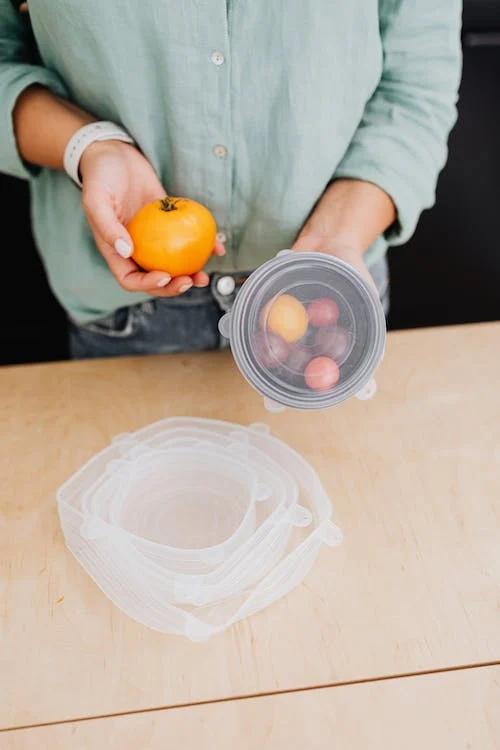Good composting management usually keeps flies away.
A few flies can be beneficial since in the compost food web they are considered physical decomposers, helping to break down compost material. Their eggs are also a source of food for other compost creatures. But flies breed fast and if there are a lot of them it’s both a nuisance and a sign that something has gone wrong.
Their presence is likely due to the following issues in the bin:
- Lack of oxygen – when there is not enough air, composting is slow and the temperature drops – conditions which attract flies. So add oxygen by aerating with an aerator stick. You can also poke holes in the compost with an iron bar. Deep aeration also disturbs the fly reproductive cycle; some types breed every five days. Raise the temperature by fitting the Insulating Jacket on the Green Johanna and adding bokashi bran, which will introduce more beneficial microbes and speed up decomposition.
- Too much moisture – the water content should be about 50 per cent. If there is more water than this, it can force air out, which leads to anaerobic conditions (without air) causing slow decomposition and bad smells, which attract flies. You can monitor compost moisture levels by testing with a moisture meter or by squeezing it in your hands. If it feels like a wrung-out sponge, it has the right consistency. There should only be one or two drops of liquid visible. If it’s wetter than this, add some absorbent material such as shredded paper or sawdust and aerate.
- Imbalance of materials – a mixture of materials high in carbon (Browns) and nitrogen (Greens) is essential for active composting. Aim for roughly half and half of both.
- Poorly-covered nitrogen-rich materials (Greens) – bury smelly foods in the compost, wrapped in newspaper if possible. Create a covering layer over the top to capture smells. This can include straw, sawdust, wood chips or mature compost. A fly-proof mesh over the top of the contents will keep flies out while allowing air in.
As the compost becomes active, with raised temperature and faster decomposition, the fly infestation should end.

Fruit flies in particular are one of the most common nuisances in the UK, affecting more than 60% of households.
Fruit flies, also known as vinegar flies, are not your common or garden (or house) fly; they do not usually enter the home through the door or window, they come in with the fruit that you buy or get from the garden.
Adult fruit flies lay eggs on the fruit’s skin and these hatch later when the temperature is right. Fruit flies have a strong sense of smell and are attracted by the smell of overripe or rotting organic matter.
The eggs are microscopic, so they’re invisible, until suddenly – they’re not. Obviously, if the eggs are already in fruit skins when added to a composter there’s a chance they might hatch inside it.
There are several steps you can take to minimise the risk.
In the home
- Because fruit flies lay eggs on exposed food, take care to keep food stored in a fridge or lidded containers, not out in the open in fruit bowls.
- Use up ripe fruit and vegetables as soon as possible.
- Compost organic matter quickly as fruit flies are attracted by the smell of decomposing food.
- Keep stored waste in a lidded kitchen caddy. Always keep the lid on your caddy, even between new additions of waste as you are preparing food.
In the compost bin
Follow the steps mentioned above regarding composting management and also:
- Add more carbon-rich materials (woody garden waste/shredded paper/cardboard/wood chips), and mix in well so that any food waste is covered.
- Top the contents with a layer of fresh soil.
- Try putting the composter in sunlight – flies like a warm but not hot environment.
- Make sure that you always lock the lid securely.
- Take care not to spill any food around the composter.
- Monitor acidity – if you have added a lot of fermented content from a bokashi bin to your composter, add a handful of crushed baked eggshells to neutralise excessive acidic conditions as flies prefer a low (acidic) pH.
- Flies don’t like the smell of certain plants – peppermint in particular – so you could add sprigs of peppermint to your waste and wipe round the compost bin with lavender, lemongrass, eucalyptus and peppermint essential oils.
- Leave the lid off the bin for a while to allow predators such as ground beetles, rove beetles and earwigs easy access to the flies.
- Use nematodes – microscopic worms that feed on fly larvae in soil.
In the Green Cone
In the case of the Green Cone Food Waste Digester, no garden waste can be added as the Cone only accepts food waste, so covering with garden and paper waste is not an option.
Because the Cone’s basket is underground, smells are filtered out by the surrounding soil, meaning there is no obvious attraction for ordinary flies. But if fruit fly eggs are already in fruit skins when added to the Cone, they might hatch inside it. Avoid this by following the advice above on preventing infestations in the home.
Also:
- Freeze your fruit and veg scraps in a plastic bag or container overnight to kill any eggs or larvae before adding them to the Cone.
- Flies don’t like the smell of certain plants – peppermint in particular – so you could add sprigs of peppermint to your waste and wipe round the Cone with lavender, lemongrass, eucalyptus and peppermint essential oils.
- Add accelerator powder to add more beneficial bacteria to speed up decomposition.
- Remember food waste should never come higher than the top of the Cone’s underground basket; waste should never be above ground level.
Get trap happy
You could also try a home-made trap that will act as a magnet.
Add an inch of apple cider vinegar to a glass jar with two drops of washing up liquid. Put a plastic wrap cover over the top of the jar and poke small holes through with a toothpick. Flies are attracted by the smell and can get in but can’t get out. Remember to change the liquid regularly to keep the fly trap working.
If all else fails, consider disposable fly traps which come pre-filled with bait or attractant and can be placed in the bin. Be aware that these may also kill other beneficial decomposers in the compost.


